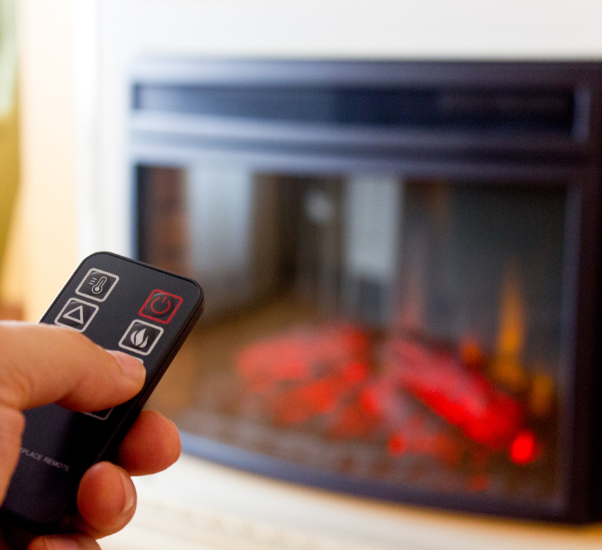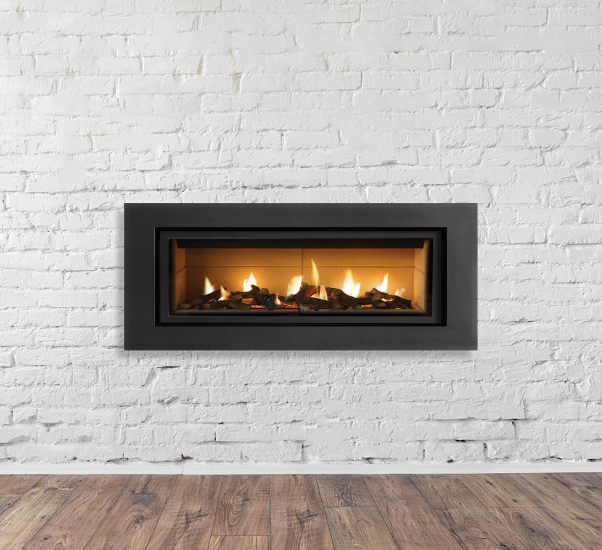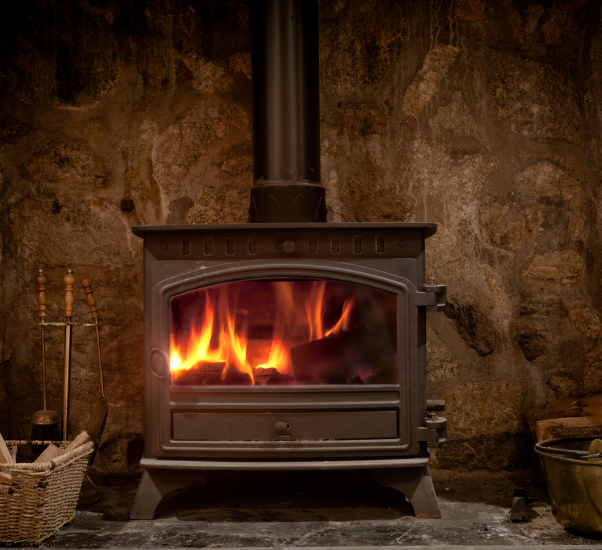There's nothing quite like a cosy fire in the colder months, creating an inviting atmosphere in your living room and helping you relax and unwind after a long day.
As well as being aesthetically pleasing, fireplaces are a great heating alternative instead of relying on your central heating system. This is especially true if you only want to heat just one room and save money on heating bills in the long run.
Selecting the perfect fire for your living room can be a difficult task though as there are several different options to choose from. Ranges here include electric fireplaces, gas fireplaces, and wood-burning stoves. And, they all come in all different shapes and sizes bringing their unique style to your living space, while providing an impressive heating output.
At City Plumbing, our heating experts have compiled a list of some of the best types of fires for your living room, offering tips to help you choose the right fire for your needs.
Electric Fireplaces
Electric fireplaces are the most popular choice of fire and a fantastic option for homeowners when looking for the best addition to a living room.
Not only are electric fires incredibly easy to install, but they also provide an efficient and cost-effective heating solution. With various designs and styles available, such as the Valor Masquerade range, they create a warm and inviting atmosphere in the home. Electric fires also provide the added benefit of not having to worry about the emissions or maintenance of a traditional fire, allowing you to enjoy all their benefits without the hassle.
One of the unique advantages of electric fires is that they’re extremely energy efficient, which can help to save money on your heating bills. Unlike traditional fires, electric fires do not require any special ventilation or chimneys, making them safe from harmful fumes or gases.
Another appealing feature of electric fires is that most brands provide a wide range of styles and designs, allowing you to customise the look to fit and utilise the fire as the main focal point in your space.

Extra benefits of choosing an Electric Fireplace for your living space:
- Various heating outputs are available to choose from
- Electric fires are ideal if you have a lower budget
- Additional LED lights will create a realistic flame effect
- Most electric fires are fully remote-controlled, so you won't have to leave the comfort of your chair to use them!
Are Electric Fires Cheap to Run?
Electric fires are considered more efficient and cost-effective to heat your home and generally cheaper to run than gas or oil-fired heating systems.
Additionally, electric fires are typically more efficient than traditional radiators. However, the cost of running an electric fire will depend on several factors, including the kilowatt output of the fire, the insulation of your property, and the temperature you set the fire.
Do Electric Fireplaces Plug In?
Electric fires are just like any other electrical appliance. They simply plug into a standard electrical socket and usually come with a cord that is long enough to reach.
Yet, the electrical outlet will need to handle the wattage of the electric fire to avoid any safety hazards.
Gas Fireplaces
Gas fireplaces add a cosy and inviting atmosphere to your living room thanks to their aesthetic appeal and practical benefits. These fires provide warmth without the hassle and mess of traditional wood-burning fireplaces. Gas fires are also very convenient, as they can be easily turned on and off with a button or switch on a remote control.
Modern gas fires are also designed to be energy-efficient, which can help reduce heating costs and promote sustainability. Overall, gas fires can be a great addition to living rooms, providing both aesthetic appeal and practical benefits.
Unlike Electric fires, gas fires require either a pre-cast flue or pre-fabricated flue to fucntion or a brick chimney, like those in the Valor Black Beauty range. They work by burning natural gas or propane to generate heat. The gas is ignited by a pilot light and then controlled by a valve, which regulates gas flow to the burner. The burner will then heat a set of ceramic logs or decorative coals, radiating heat into your living space.
There are some gas fires which have a blower or fan that helps to circulate warm air more effectively, making them a popular choice for homeowners who value ease of use without being overly complicated.

Additional benefits of having a Gas Fireplace:
- Gas fires can heat up quickly, providing instant heat
- Low maintenance
- Gas fires produce fewer carbon emissions
- More versatile and offers a variety of different styles to match décor
Can Gas Fireplaces Be Dangerous?
Gas fireplaces are safe when installed and used correctly. But, they can be dangerous if not adequately maintained, potentially leading to a gas leak that could cause a fire.
It's crucial to have a professional inspect and service your gas fireplace regularly to ensure it functions safely.
Additionally, make sure to always follow the manufacturer's instructions and never leave a gas fireplace unattended while it’s in use.
Will Gas Fireplaces Be Phased Out?
There’s currently no plan to phase out gas fireplaces. However, more recently, there has been a push towards more environmentally-friendly options such as electric fireplaces or wood-burning stoves. This is especially true since the UK government’s plans were released for net zero in 2050.
Wood-Burning Stoves
Having a wood-burning stove in your living room has numerous benefits. First and foremost, a wood-burning stove will significantly reduce your heating bills during the colder months as it uses wood, a renewable resource, to produce heat in your living space. This makes it more environmentally friendly in contrast to fossil fuels.
Wood-burning stoves such as the Broseley Serrano range, will contain a firebox where the wood is burned. The heat that is produced will warm up the stove's metal body, which then radiates the heat into your living space. The chimney keeps the fire burning by drawing in air to the stove and allowing the smoke and gases to escape out of the property.
Additionally, wood-burning stoves provide a warm ambience to enhance the overall atmosphere of your living room. You can wind down after a long day with friends and family around the fire.
Finally, a wood-burning stove can add to the value of your home and be a great selling point if you ever decide to put your home on the market.

Extra benefits of a wood-burning stove:
- Save money on your heating bills
- Cracking fire will create a cosy ambience - perfect for relaxing
- Some stoves may allow you to prepare meals and even boil water
Can Wood-Burning Stoves Provide Carbon Monoxide?
Wood-burning stoves can produce carbon monoxide, especially if not adequately ventilated. So, it’s crucial to ensure that your stove has been correctly installed and that you have a carbon monoxide detector situated in your home to keep you and your family safe.
Regular maintenance and cleaning of your wood-burning stove can also help prevent the build-up of carbon monoxide.
Are Wood-Burning Stoves Efficient?
Wood-burning stoves can be pretty efficient, yet, it all depends on a few factors. Such factors include the type of wood used, the design of the wood burner, and how well you maintain the stove, all of which can impact efficiency.
Generally speaking, newer wood-burning stoves are more efficient than older models, as they’re developed to burn the wood completely while producing less smoke.
And, if you use dry seasoned wood that has been stored properly, this can also increase the efficiency of your wood-burning stove.
We hope the tips and guidance above helps you decide on the perfect fireplace for your living room.
Whether you choose a traditional wood-burning stove or a modern electric option, a cosy fire can be an eye-catching centrepiece providing warmth and ambience to any living space.
If you require more expert advice about electric, gas fireplaces, or wood-burning stoves, or want more information on how they work, their installation requirements, or anything else - please get in touch or visit your local City Plumbing branch by using our branch locator.
Other articles

The Benefits of an Annual Boiler Service
08 Nov 2023 ・ 5 mins

Stay Warm This Winter With a Budget Boiler
30 Oct 2023 ・ 5 mins

5 Essential Tips to Improve Your Energy Efficiency
20 Oct 2023 ・ 4 mins



